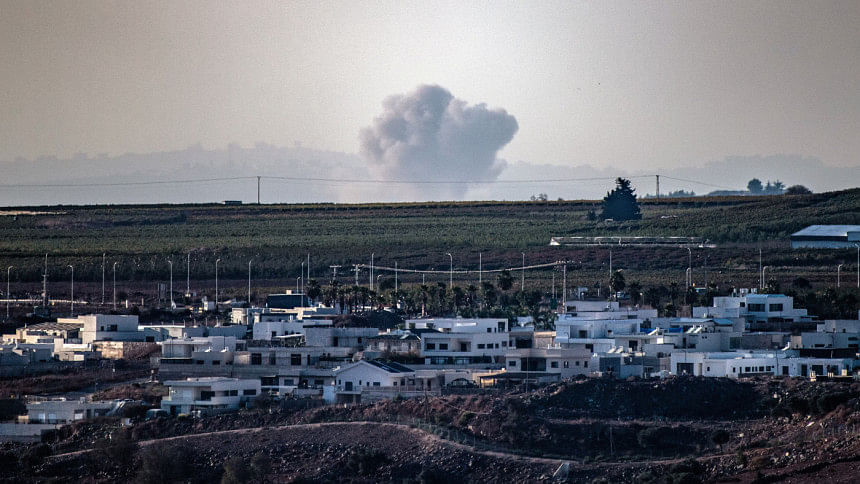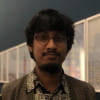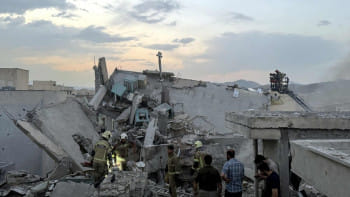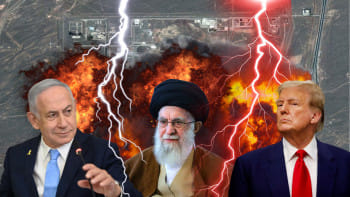The Middle East as a time loop

In a region often dismissed as irredeemably cyclical and eternally combustible, the Middle East has long been subjected to historical reductionism—a misrepresentation that essentialises its conflicts as tribal, religious, or simply ancient. Yet what if we were to read this geopolitical entanglement not merely through history textbooks or conventional foreign policy analysis, but through a cultural and philosophical prism—specifically, that offered by the German Netflix series Dark? This sci-fi masterpiece, with its obsessive exploration of time, recursion, determinism, and identity, provides an eerily apt framework for rethinking the Middle Eastern quagmire—not as a series of isolated, irrational combustions, but rather as a temporal knot that replicates itself across generations, political regimes, and ideological binaries.
The temporal trap: Eternal recurrence and the Middle East
In Dark, time is not linear; it is a loop, a serpent devouring its own tail, where past, present, and future fold into each other, collapsing the illusion of progression into the inevitability of repetition. This very logic—of recurrence masquerading as change—bears uncanny resemblance to the contemporary Middle Eastern crises, particularly the seemingly perennial Israeli-Palestinian conflict, the oscillating Western-Iranian antagonism, and the theatre of proxy wars sprawled across Lebanon, Syria, and Yemen. Each flare-up, each ceasefire, each promise of a "new beginning" fold back into a previously lived moment, only disguised in altered rhetoric and upgraded military hardware.
The recurring wars in Gaza, for instance, echo the time loop of Winden, the fictional town in Dark, where the same tragedies are performed by different actors across generations. In both terrains—Winden and the Middle East—the failure to escape history is not due to lack of desire or intelligence, but rather because the architecture of the conflict itself is built upon feedback loops, mechanisms of vengeance, and inherited traumas that have become so intrinsic they function like time machines—dragging new generations back into old wars.
Sic Mundus Creatus Est: The deep state, myth, and self-perpetuating ideology
The secret society Sic Mundus Creatus Est, which orchestrates time travel and enforces the illusion of fate, serves as a metaphor for the entrenched institutional actors—state and non-state—who operate above the visible scaffolding of regional politics. Whether embodied in the military-intelligence apparatuses of regional powers like Israel and Iran, or foreign policy think tanks that shape Western interventionist discourses, these actors replicate the role of Adam and Eva—both of whom, despite ostensibly opposing aims, work together to preserve the knot, to ensure the cycle continues. Peace, like free will in Dark, becomes an illusion strategically evoked but never actualised.
The war on Iran, which has once again resurfaced through targeted strikes and retaliations, must be read not merely as a response to nuclear ambitions or ideological threat, but as part of a self-sustaining myth—a political bootstrap paradox—where threats are manufactured to justify security states. Security states, in turn, manufacture threats to preserve themselves. The media's complicity, as seen in its resurrection of hawkish voices from the Iraq War era, echoes Dark's philosophical insight that no message is original; all knowledge is passed down, regurgitated, and re-legitimised in new form. Like the originless time machine, policy discourses in the Middle East have no verifiable point of departure—only cyclical justifications for present acts.
Jonas and Martha: Mirror worlds and competing realities
The existence of dual worlds in Dark—one led by Jonas (Adam), the other by Martha (Eva)—presents an evocative metaphor for the bifurcated realities that exist in Middle Eastern narratives. Each side in the conflict constructs its worldview as self-contained, internally coherent, yet fundamentally incompatible with the other. Whether it is the way Israel frames its military actions as pre-emptive defence against Iranian aggression or the way Iran justifies its regional interventions as resistance to imperialism, both operate within closed epistemologies. The simultaneity of truth and fiction—of fact and belief—within these parallel systems renders communication between them near-impossible.
In the real world, as in Dark, the consequences of these mirror narratives are devastating: both sides see themselves as resisting annihilation while being blind to how their actions mirror their adversaries. Netanyahu invoking "Women, Life, Freedom" to justify strikes on Iranian soil functions as a cynical appropriation, not unlike Adam pretending to pursue peace while orchestrating an apocalypse. The tragedy lies in the sincerity with which actors believe they are liberators, unaware—or unwilling to accept—that they too are the products of trauma loops passed down through generations.
The origin world: Lost opportunities and the mirage of diplomacy
The third season of Dark reveals that the two warring timelines were born from a third—the origin world—where tragedy was not inevitable, and where time could have continued without collapse had one man, Tannhaus, not tried to manipulate time to reverse personal loss. In the Middle East, this origin world might be analogised to the landscape of lost diplomatic opportunities: the Joint Comprehensive Plan of Action (JCPOA), the Arab Peace Initiative, the Oslo Accords, and countless other short-lived openings. Each failed negotiation is not just a missed chance, but a portal that, once closed, creates alternative timelines in which escalation becomes the only reality.
Tannhaus, in his desperate attempt to bring back his dead family, inadvertently creates worlds of suffering. Similarly, the interventions—whether military or ideological—of foreign powers attempting to "fix" the Middle East often generate new catastrophes: proxy wars, radicalisation, economic collapse—thus expanding the knot rather than dissolving it. The tragedy is not only that the war continues, but that the logic of intervention presumes suffering can be reversed through force rather than contained through humility.
Censorship, media loops, and the suppression of dissonance
In Dark, time travellers are hunted, silenced, or discredited for possessing truths that disrupt the cycle. In contemporary Middle Eastern crises, dissenting voices—whether Palestinian journalists, Iranian dissidents critical of both regime and foreign aggression, or Israeli peace activists—are subjected to analogous mechanisms of silencing. Censorship, surveillance, and narrative control are not peripheral tactics; they are central to the maintenance of the illusion that the conflict is binary and resolvable through dominance.
Just as the characters in Dark believe they are acting freely when, in fact, their choices are predetermined by the loop, contemporary media and political actors often reproduce narratives whose origin they cannot question. The role of Western media in the Iraq War, for instance, is being replayed with eerie precision in its coverage of Iran, where speculation replaces verified intelligence, and fear overrides nuance. This is not mere journalistic failure; it is a structural echo.
Breaking the knot
In the final moments of Dark, Jonas and Martha from the parallel worlds travel to the origin world and make the difficult decision to stop Tannhaus from creating the time machine, thereby dissolving their own existences to restore temporal balance. The analogy for the Middle East is unsettling but clear: the knot of suffering can only be broken when the agents of power recognise that their own existence—political, ideological, even nationalistic—may be part of the problem rather than the solution.
But unlike the fictional town of Winden, the Middle East cannot erase its history with a clean narrative reset. What is required is not oblivion, but introspection—a radical, transgenerational recognition that repetition is not destiny, and that the cycle can be broken not by force, but by confronting the traumas that bind adversaries together more tightly than either side would care to admit.
And perhaps, just perhaps, if the mirror breaks and the stories are told not by victors but by witnesses, the time loop might be undone—not by power, but by memory.
Syed Raiyan Amir is senior research associate at the KRF Center for Bangladesh and Global Affairs (CBGA). He can be reached at [email protected].
Views expressed in this article are the author's own.
Follow The Daily Star Opinion on Facebook for the latest opinions, commentaries and analyses by experts and professionals. To contribute your article or letter to The Daily Star Opinion, see our guidelines for submission.

 For all latest news, follow The Daily Star's Google News channel.
For all latest news, follow The Daily Star's Google News channel. 










Comments